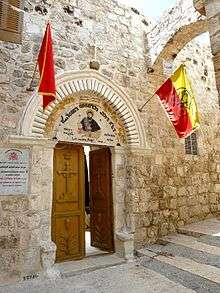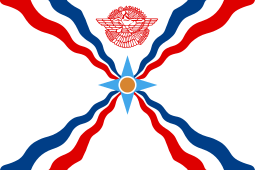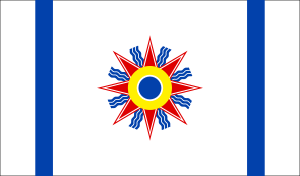Assyrians in Israel
Assyrians in Israel are Assyrians that are citizens of the State of Israel.
Sūryōyĕ, Sūrayĕ Chaldean | |
|---|---|
| Total population | |
| 5,000 [1] | |
| Regions with significant populations | |
| Jerusalem, Tel Aviv | |
| Languages | |
| Neo-Aramaic, Hebrew, Arabic | |
| Religion | |
| Assyrian Church of the east Syriac Orthodox Church Chaldean Catholic Church | |
| Related ethnic groups | |
| Arameans in Israel |
History
721 BCE, the Assyrian army captured the Israelite capital at Samaria and carried away the citizens of the northern Kingdom of Israel into captivity. Although Judah was a vassal of Assyria during this time and paid an annual tribute to the powerful empire, it was the most important state between Assyria and Egypt.
The modern Assyrian presence in Israel mainly originated from Assyrians fleeing the Assyrian genocide from Tur Abdin in 1915. Many found refuge in what was known as the "Syriac Quarter" in Bethlehem.[2] The Assyrians in Israel mostly live within the city of Jerusalem.
Religion

Assyrians are predominantly Christians of the East and West Syriac Rite. Majority of Assyrians in Israel are adherents of the Syriac Orthodox Church.
Catholic Assyrians
Syriac Catholic Church
The Syriac Catholic Church has a Patriarchal Exarchate formed in 1892 and is based out of the Church of Saint Thomas in Jerusalem. As of 2015, there are 3 parishes in Israel with an estimated 3,000 adherents.
Chaldean Catholic Church
Since 1903, the Chaldean Catholic Church has been represented in Jerusalem by a non-resident patriarchal vicar. In 1997, the Chaldean Catholic Church established the Territory Dependent on the Patriarch which was previously governed as the Patriarchal Vicariate of Jerusalem within the Patriarch's own archeparchy. [3]
Orthodox Assyrians
Syriac Orthodox Church
The Syriac Orthodox Church is the largest Assyrian church in Israel, covered by the Archbishopric of Israel, Palestine and Jordan under the spiritual guidance and direction of Archbishop Gabriel Dahho.
The most notable monastery in Israel is the Monastery of Saint Mark in Jerusalem. The Syriac Orthodox Church also has sharing rights to the Church of the Holy Sepulchre and minor rights to the Tomb of the Virgin Mary where they possess an altar on the western side of the holy site.
See also
References
- Shams, Alex. "Learning the language of Jesus Christ". Roads & Kingdoms. Retrieved 23 July 2019.
- Shams, Alex. "Learning the language of Jesus Christ". Roads & Kingdoms. Retrieved 23 July 2019.
- Eldar, Yishai. "Focus on Israel: The Christian Communities of Israel". Israeli Ministry of Foreign Affairs. Retrieved 23 July 2019.
Further reading
- Sedan, Gil. "Assyrian community speaks Aramaic, provides a warm welcome to Israelis." Jewish Telegraphic Agency, February 27, 2003.
- Sedan, Gil. "Jews and Arabs work separately to preserve Aramaic." Jewish Telegraphic Agency, August 30, 2002.
- Sun, John Russel. "Assyrians along with other Christians celebrated Easter in Jerusalem." AFP, April 8, 2007.


